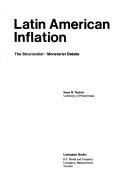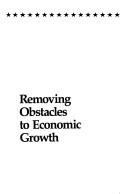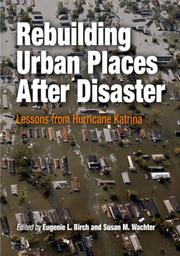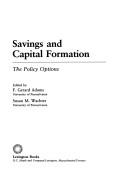| Listing 1 - 10 of 67 | << page >> |
Sort by
|

ISBN: 066999622X 9780669996227 Year: 1976 Publisher: Lexington, Mass. Lexington Books
Abstract | Keywords | Export | Availability | Bookmark
 Loading...
Loading...Choose an application
- Reference Manager
- EndNote
- RefWorks (Direct export to RefWorks)
Money. Monetary policy --- Latin America --- Inflation (Finance) --- Money supply --- LAM / Latin America - Latijns Amerika - Amérique Latine --- 336.748.12 --- 333.841 --- -333.403 --- -Money stock --- Quantity of money --- Supply of money --- Money --- Demand for money --- Monetary policy --- Algemeen prijsniveau. Prijsindex. Prijsstijging --- Inflatie. --- Monetaire theorieën. Kwantitatieve theorie. Theorie van de incasso's. Optiek van de uitgaven en inkomens. --- -Algemeen prijsniveau. Prijsindex. Prijsstijging --- 336.748.12 Algemeen prijsniveau. Prijsindex. Prijsstijging --- -336.748.12 Algemeen prijsniveau. Prijsindex. Prijsstijging --- Money stock --- 333.403 --- Monetaire theorieën. Kwantitatieve theorie. Theorie van de incasso's. Optiek van de uitgaven en inkomens --- Inflatie --- Inflation (Finance) - Latin America --- Money supply - Latin America
Book
ISBN: 0812292405 081224785X Year: 2016 Publisher: Philadelphia, Pennsylvania : University of Pennsylvania Press,
Abstract | Keywords | Export | Availability | Bookmark
 Loading...
Loading...Choose an application
- Reference Manager
- EndNote
- RefWorks (Direct export to RefWorks)
While the nation's GDP has doubled in the last thirty years, significant increases in family income have been restricted to a small subset of the American population. This disjunct between national economic growth and stagnating incomes in all but the very top tier of the population corresponds with increasing economic inequality and a lack of social and economic mobility. As a consequence, neighborhoods and metropolitan areas have become more polarized. Stark geographic differences in levels of poverty, income, health outcomes, job opportunities, lifetime earning potential, and educational attainment highlight the degree to which place matters in terms of social and economic opportunity. Shared Prosperity in America's Communities examines this place-based disparity of opportunity and suggests what can be done to ensure that the benefits of economic growth are widely shared. Contributors' essays explore social and economic mobility throughout the country to illuminate the changing geography of inequality, offer a portfolio of strategies to address the challenges of place-based inequality, and show how communities across the nation are implementing change and building a future of shared prosperity. Approaching the problem from the vantage point of economics, sociology, and public policy, Shared Prosperity in America's Communities offers a timely analysis of the country's growing socioeconomic and geographic division and shows how communities can respond to the challenge of economic inequality to build a nation of opportunity for all. Contributors: J. Cameron Anglum, Timothy J. Bartik, Chris Benner, Angela Glover Blackwell, Anthony P. Carnevale, Raj Chetty, Rebecca Diamond, Lei Ding, Paul A. Jargowsky, David N. Karp, Elizabeth Kneebone, Douglas S. Massey, Jeremy Nowak, Manuel Pastor, Victor Rubin, Chris Schildt, Nicole Smith, Margery Austin Turner, Susan M. Wachter, Zachary D. Wood.
Metropolitan areas --- Economic development --- Economic aspects --- United States --- Economic conditions --- Regional disparities. --- Political Science. --- Public Policy. --- Urban Studies.

ISBN: 0812279239 1512808202 9780812279238 Year: 1984 Publisher: Philadelphia, Pa University of Pennsylvania Press
Abstract | Keywords | Export | Availability | Bookmark
 Loading...
Loading...Choose an application
- Reference Manager
- EndNote
- RefWorks (Direct export to RefWorks)
The focus of the volume is on potential policy remedies for the economic problems of slow real output and productivity growth.
Economic conditions. Economic development --- Economic policy and planning (general) --- United States --- Economic policy --- Economic conditions --- AA / International- internationaal --- US / United States of America - USA - Verenigde Staten - Etats Unis --- 382.51 --- 333.101 --- 333.137 --- 331.31 --- 338.8 --- 339.311.3 --- 336.61 --- 338.043 --- 333.846.0 --- Wharton /Reliance symposium held in Philadelphia in May 1983. --- Aard, belang en evolutie. Handelsbalans. J curve. --- Banksysteem en bankstelsel. --- Buitenlandse en koloniale banken.Bancaire internationalisering. --- Economisch beleid. --- Economische groei. --- Evolutie van het sparen. --- Financieel beleid. --- Technologische vooruitgang. Automatisering. Computers. Werkgelegenheid en informatica. --- Verband tussen het monetair, bank- en kredietbeleid en de economische ontwikkeling: algemeenheden. --- Wharton /Reliance symposium held in Philadelphia in May 1983 --- Economisch beleid --- Banksysteem en bankstelsel --- Buitenlandse en koloniale banken.Bancaire internationalisering --- Verband tussen het monetair, bank- en kredietbeleid en de economische ontwikkeling: algemeenheden --- Financieel beleid --- Technologische vooruitgang. Automatisering. Computers. Werkgelegenheid en informatica --- Economische groei --- Evolutie van het sparen --- Aard, belang en evolutie. Handelsbalans. J curve --- BUSINESS & ECONOMICS / Economics / General. --- United States - Economic policy - 1971-1981 --- United States - Economic conditions - 1971-1981 --- United States - Economic conditions - 1981 --- -United States - Economic policy - 1981-1993 --- Business. --- Economics. --- United States of America

ISBN: 0812219805 9780812219807 0812204484 1283897970 Year: 2006 Volume: *1 Publisher: Philadelphia University of Pennsylvania press
Abstract | Keywords | Export | Availability | Bookmark
 Loading...
Loading...Choose an application
- Reference Manager
- EndNote
- RefWorks (Direct export to RefWorks)
Disasters-natural ones, such as hurricanes, floods, or earthquakes, and unnatural ones such as terrorist attacks-are part of the American experience in the twenty-first century. The challenges of preparing for these events, withstanding their impact, and rebuilding communities afterward require strategic responses from different levels of government in partnership with the private sector and in accordance with the public will.Disasters have a disproportionate effect on urban places. Dense by definition, cities and their environs suffer great damage to their complex, interdependent social, environmental, and economic systems. Social and medical services collapse. Long-standing problems in educational access and quality become especially acute. Local economies cease to function. Cultural resources disappear. The plight of New Orleans and several smaller Gulf Coast cities exemplifies this phenomenon. This volume examines the rebuilding of cities and their environs after a disaster and focuses on four major issues: making cities less vulnerable to disaster, reestablishing economic viability, responding to the permanent needs of the displaced, and recreating a sense of place. Success in these areas requires that priorities be set cooperatively, and this goal poses significant challenges for rebuilding efforts in a democratic, market-based society. Who sets priorities and how? Can participatory decision-making be organized under conditions requiring focused, strategic choices? How do issues of race and class intersect with these priorities? Should the purpose of rebuilding be restoration or reformation? Contributors address these and other questions related to environmental conditions, economic imperatives, social welfare concerns, and issues of planning and design in light of the lessons to be drawn from Hurricane Katrina.
Urban renewal --- 711.168 --- 911.375 --- 551.515.2 --- Model cities --- Renewal, Urban --- Urban redevelopment --- Urban renewal projects --- City planning --- Land use, Urban --- Urban policy --- Planologie: restauratieplannen; wederopbouwplannen; herbouwplannen --- Urban settlements (their study and geography). Towns. Cities --- Tropical cyclones. Hurricanes. Typhoons --- 711.168 Planologie: restauratieplannen; wederopbouwplannen; herbouwplannen --- 551.515.2 Tropical cyclones. Hurricanes. Typhoons --- Hurricane Katrina, 2005 --- Katrina, Hurricane, 2005 --- Hurricanes --- Cities and towns --- Civic planning --- Redevelopment, Urban --- Slum clearance --- Town planning --- Urban design --- Urban development --- Urban planning --- Land use --- Planning --- Art, Municipal --- Civic improvement --- Regional planning --- Government policy --- Management --- New Orleans (La.) --- Big Easy (La.) --- Crescent City (La.) --- La Nouvelle-Orléans (La.) --- NOLA (La.) --- Nawlins (La.) --- Neu Orleans (La.) --- Nieuw Orleans (La.) --- Nouvelle-Orléans (La.) --- Neuva Orleans (La.) --- Nueva Orleans (La.) --- Nuova Orleans (La.) --- City of New Orleans (La.) --- Cité d'Orléans (La.) --- Orleans Parish (La.) --- Economic conditions. --- Social conditions. --- Louisiana --- New Orleans, La. --- Social conditions --- Economic conditions --- Hurricane Katrina, 2005. --- Architecture. --- Business. --- Economics. --- Fine Art. --- Garden History. --- Public Policy. --- Technology and Engineering. --- Urban Studies.

ISBN: 0669110175 9780669110173 Year: 1986 Publisher: Lexington Lexington books
Abstract | Keywords | Export | Availability | Bookmark
 Loading...
Loading...Choose an application
- Reference Manager
- EndNote
- RefWorks (Direct export to RefWorks)
Saving and investment --- Congresses --- United States --- Economic policy --- 330.56 --- -US / United States of America - USA - Verenigde Staten - Etats Unis --- 339.311.6 --- 339.311.3 --- 339.310 --- 339.312.0 --- 339.311.0 --- Papers presented at the 1st annual conference of the Savings Forum, Federal Reserve Bank of Philadelphia, May 1985. --- NBB congres --- Accumulation, Capital --- Capital accumulation --- Capital formation --- Investment and saving --- Saving and thrift --- Capital --- Supply-side economics --- Wealth --- Investments --- Nationaal inkomen. Volksinkomen. Gezinsinkomen. Vermogensstratificatie. Particuliere inkomens en bestedingen. Armoede. Honger --- Beleid met betrekking tot het sparen (zie pensioensparen 332.834). --- Evolutie van het sparen. --- Inkomens, besparingen en investeringen. --- Investeringen: algemeenheden. --- Sparen: algemeenheden. --- -Congresses. --- 330.56 Nationaal inkomen. Volksinkomen. Gezinsinkomen. Vermogensstratificatie. Particuliere inkomens en bestedingen. Armoede. Honger --- U.S.A. --- Jungtinės Amerikos valstybės --- Soedinennye Shtaty Si︠e︡vernoĭ Ameriki --- Soedinennye Shtaty Severnoĭ Ameriki --- Si︠e︡vero-Amerikanskīe Soedinennye Shtaty --- Severo-Amerikanskie Soedinennye Shtaty --- Zlucheni Derz︠h︡avy --- USA --- US --- Arhab --- Ar. ha-B. --- Artsot ha-Berit --- ولايات المتحدة الامريكية --- Wilāyāt al-Muttaḥidah al-Amirīkīyah --- ABSh --- Amerika Birlăshmish Shtatlary --- ABŞ --- Amerika Birlăşmi Ştatları --- Forente stater --- Spojené staty americké --- Severo-Amerikanskie Shtaty --- Sjedinjene Američke Države --- Zʹi︠e︡dnani Derz︠h︡avy Ameryky --- Amerikai Egyesült Államok --- Yhdysvallat --- Verenigde Staten --- Egyesült Államok --- Hiwsisayin Amerikayi Miatsʻeal Tērutʻiwnkʻ --- Estados Unidos de América --- United States of America --- Fareyniḳṭe Shṭaṭn --- Artzois Ha'bris --- Estados Unidos da América do Norte --- SShA --- Soedinennye Shtaty Ameriki --- VSA --- États-Unis d'Amérique --- Vereinigte Staaten von Amerika --- Stati Uniti d'America --- Estados Unidos --- EE.UU. --- Stany Zjednoczone --- ĒPA --- Amerika Qūrama Shtattary --- Amerika Qŭshma Shtatlari --- SAD --- Saharat ʻAmērikā --- Hēnomenai Politeiai Amerikēs --- ZSA --- Mei-kuo --- Meiguo --- Mei guo --- ZDA --- Združene države Amerike --- U.S. --- America (Republic) --- Amirika Carékat --- Verenigde State van Amerika --- VS --- ولايات المتحدة --- Wilāyāt al-Muttaḥidah --- ولايات المتّحدة الأمريكيّة --- Wilāyāt al-Muttaḥidah al-Amrīkīyah --- Estatos Unitos --- Estatos Unitos d'America --- Ètats-Unis d'Amèrica --- Estaos Xuníos d'América --- Estaos Xuníos --- Tetã peteĩ reko Amérikagua --- Istadus Unidus --- Amerika Birlăşmiş Ştatları --- Amerika ka Kelenyalen Jamanaw --- Bí-kok --- Amerika Qushma Shtattary --- AQSh --- Злучаныя Штаты Амерыкі --- Zluchanyi︠a︡ Shtaty Ameryki --- Yunaeted Stet blong Amerika --- Yunaeted Stet --- Vaeinigte Staatn --- Vaeinigte Staatn vo Amerika --- Stadoù-Unanet Amerika --- Sŭedineni amerikanski shtati --- САЩ --- SASht --- Съединените щати --- Sŭedinenite shtati --- Америка (Republic) --- Amerika (Republic) --- Estats Units d'Amèrica --- Америкӑри Пӗрлешӳллӗ Штатсем --- Amerikări Pĕrleshu̇llĕ Shtatsem --- Stati Uniti --- SUA (Stati Uniti d'America) --- Unol Daleithiau America --- Unol Daleithiau --- Amerikas Forenede Stater --- Vereinigte Staaten --- Wááshindoon Bikéyah Ałhidadiidzooígíí --- Zjadnośone staty Ameriki --- Ameerika Ühendriigid --- Ηνωμένες Πολιτείες της Αμερικής --- Hēnōmenes Politeies tēs Amerikēs --- Η.Π.Α. --- Ē.P.A. --- Usono --- Unuiĝintaj Ŝtatoj de Ameriko --- Американь Вейтьсэндявкс Штаттнэ --- Amerikanʹ Veĭtʹsėndi︠a︡vks Shtattnė --- Ameriketako Estatu Batuak --- Feriene Steaten --- Feriene Steaten fan Amearika --- FS --- Stâts Unîts di Americhe --- Stâts Unîts --- Stáit Aontaithe Mheiriceá --- Steatyn Unnaneysit America --- Steatyn Unnaneysit --- S.U.A. --- Na Stàitean Aonaichte --- NSA --- Mî-koet --- 미국 --- Miguk --- Amerikayi Miatsʻyal Nahangner --- Miatsʻyal Nahangner --- Papers presented at the 1st annual conference of the Savings Forum, Federal Reserve Bank of Philadelphia, May 1985 --- US / United States of America - USA - Verenigde Staten - Etats Unis --- Inkomens, besparingen en investeringen --- Sparen: algemeenheden --- Evolutie van het sparen --- Beleid met betrekking tot het sparen (zie pensioensparen 332.834) --- Investeringen: algemeenheden --- Saving and investment - United States - Congresses --- United States - Economic policy - 1981-1993 - Congresses

ISBN: 0812278194 0812211421 1512819166 9780812211429 9780812278194 Year: 1983 Publisher: Philadelphia University of Pennsylvania
Abstract | Keywords | Export | Availability | Bookmark
 Loading...
Loading...Choose an application
- Reference Manager
- EndNote
- RefWorks (Direct export to RefWorks)
This volume presents some of the most critical and erudite opinions on the economy today. Bringing together the experience, predictions, and recommendations of distinguished leaders in politics, labor, and business, it provides a comprehensive examination of contrasting views in order to identify the shape that America's new industrial policy may take.
Industrial policy --- -658.11 --- 658.11 Kinds and forms of enterprise --- Kinds and forms of enterprise --- Business --- Industries --- Industry and state --- Economic policy --- Congresses --- Government policy --- United States --- -Congresses. --- Proceedings of a symposium held in Philadelphia, March 1981. --- U.S.A. --- Jungtinės Amerikos valstybės --- Soedinennye Shtaty Si︠e︡vernoĭ Ameriki --- Soedinennye Shtaty Severnoĭ Ameriki --- Si︠e︡vero-Amerikanskīe Soedinennye Shtaty --- Severo-Amerikanskie Soedinennye Shtaty --- Zlucheni Derz︠h︡avy --- USA --- US --- Arhab --- Ar. ha-B. --- Artsot ha-Berit --- ولايات المتحدة الامريكية --- Wilāyāt al-Muttaḥidah al-Amirīkīyah --- ABSh --- Amerika Birlăshmish Shtatlary --- ABŞ --- Amerika Birlăşmi Ştatları --- Forente stater --- Spojené staty americké --- Severo-Amerikanskie Shtaty --- Sjedinjene Američke Države --- Zʹi︠e︡dnani Derz︠h︡avy Ameryky --- Amerikai Egyesült Államok --- Yhdysvallat --- Verenigde Staten --- Egyesült Államok --- Hiwsisayin Amerikayi Miatsʻeal Tērutʻiwnkʻ --- Estados Unidos de América --- United States of America --- Fareyniḳṭe Shṭaṭn --- Artzois Ha'bris --- Estados Unidos da América do Norte --- SShA --- Soedinennye Shtaty Ameriki --- VSA --- États-Unis d'Amérique --- Vereinigte Staaten von Amerika --- Stati Uniti d'America --- Estados Unidos --- EE.UU. --- Stany Zjednoczone --- ĒPA --- Amerika Qūrama Shtattary --- Amerika Qŭshma Shtatlari --- SAD --- Saharat ʻAmērikā --- Hēnomenai Politeiai Amerikēs --- ZSA --- Mei-kuo --- Meiguo --- Mei guo --- ZDA --- Združene države Amerike --- U.S. --- America (Republic) --- Amirika Carékat --- Verenigde State van Amerika --- VS --- ولايات المتحدة --- Wilāyāt al-Muttaḥidah --- ولايات المتّحدة الأمريكيّة --- Wilāyāt al-Muttaḥidah al-Amrīkīyah --- Estatos Unitos --- Estatos Unitos d'America --- Ètats-Unis d'Amèrica --- Estaos Xuníos d'América --- Estaos Xuníos --- Tetã peteĩ reko Amérikagua --- Istadus Unidus --- Amerika Birlăşmiş Ştatları --- Amerika ka Kelenyalen Jamanaw --- Bí-kok --- Amerika Qushma Shtattary --- AQSh --- Злучаныя Штаты Амерыкі --- Zluchanyi︠a︡ Shtaty Ameryki --- Yunaeted Stet blong Amerika --- Yunaeted Stet --- Vaeinigte Staatn --- Vaeinigte Staatn vo Amerika --- Stadoù-Unanet Amerika --- Sŭedineni amerikanski shtati --- САЩ --- SASht --- Съединените щати --- Sŭedinenite shtati --- Америка (Republic) --- Amerika (Republic) --- Estats Units d'Amèrica --- Америкӑри Пӗрлешӳллӗ Штатсем --- Amerikări Pĕrleshu̇llĕ Shtatsem --- Stati Uniti --- SUA (Stati Uniti d'America) --- Unol Daleithiau America --- Unol Daleithiau --- Amerikas Forenede Stater --- Vereinigte Staaten --- Wááshindoon Bikéyah Ałhidadiidzooígíí --- Zjadnośone staty Ameriki --- Ameerika Ühendriigid --- Ηνωμένες Πολιτείες της Αμερικής --- Hēnōmenes Politeies tēs Amerikēs --- Η.Π.Α. --- Ē.P.A. --- Usono --- Unuiĝintaj Ŝtatoj de Ameriko --- Американь Вейтьсэндявкс Штаттнэ --- Amerikanʹ Veĭtʹsėndi︠a︡vks Shtattnė --- Ameriketako Estatu Batuak --- Feriene Steaten --- Feriene Steaten fan Amearika --- FS --- Stâts Unîts di Americhe --- Stâts Unîts --- Stáit Aontaithe Mheiriceá --- Steatyn Unnaneysit America --- Steatyn Unnaneysit --- S.U.A. --- Na Stàitean Aonaichte --- NSA --- Mî-koet --- 미국 --- Miguk --- Amerikayi Miatsʻyal Nahangner --- Miatsʻyal Nahangner --- 658.11 --- Congresses. --- US / United States of America - USA - Verenigde Staten - Etats Unis --- 338.023 --- 331.31 --- 338.012 --- 339.312.3 --- 338.40 --- Arbeidsproductiviteit. --- Economisch beleid. --- Energie (productiefactor). --- Financiering van de bedrijven. --- Industrieel beleid: algemeenheden. --- Американь Вейтьсэндявкс Штаттнэ --- Spojené obce severoamerické --- Proceedings of a symposium held in Philadelphia, March 1981 --- Arbeidsproductiviteit --- Economisch beleid --- Energie (productiefactor) --- Financiering van de bedrijven --- Industrieel beleid: algemeenheden --- États-Unis --- É.-U. --- ÉU --- Industry and state - United States - Congresses. --- United States - Economic policy - 1971- - Congresses. --- Business. --- Economics. --- Public Policy.
Book
ISBN: 1283890976 0812204603 0812222679 Year: 2011 Publisher: University of Pennsylvania Press
Abstract | Keywords | Export | Availability | Bookmark
 Loading...
Loading...Choose an application
- Reference Manager
- EndNote
- RefWorks (Direct export to RefWorks)
Representation of the poor has never been the top priority for civil rights organizations, which exist to eradicate racially prejudiced and discriminatory practices and policy. Scholars have argued that the activities and ideologies of civil rights groups have functioned with a distinct middle-class bias since well before the 1960's civil rights movement. Additionally, all political organizations face disincentives to represent the poor-such advocacy is expensive and politically unpopular, and often involves trade-offs with other issues that are more central to organizations' missions. In Civil Rights Advocacy on Behalf of the Poor, Catherine M. Paden examines five civil rights organizations and explores why they chose to represent the poor-specifically low-income African Americans-during six legislative periods considering welfare reform. Paden's archival research into groups such as NAACP, the Congress of Racial Equality, and the Southern Christian Leadership Conference, and her extensive interviews with movement leaders and activists reveal that national organizations advocate on behalf of the poor when they have incentives to do so. Organizational decisions to represent the poor are sometimes strategic, sometimes based on an ideological commitment, and sometimes both. However, Paden points out that decisions are never purely ideological-groups are always aware of strategy and of their positions within their issue niche when they fix their priorities. Civil Rights Advocacy on Behalf of the Poor also points to the critical role that radical organizations play in increasing representation in the U.S. political system. Paden maintains that radical groups matter not because their representation affects long-term policy change or is particularly effective in representing the interest of marginal groups. Rather, she argues, it is because they compete with more mainstream or conservative organizations for their constituencies.
African Americans --- Social advocacy --- Civil rights movements --- Poor --- Poor African Americans --- African American poor --- Disadvantaged, Economically --- Economically disadvantaged --- Impoverished people --- Low-income people --- Pauperism --- Poor, The --- Poor people --- Persons --- Social classes --- Poverty --- Advocacy, Social --- Social service advocacy --- Social work advocacy --- Social service --- Afro-Americans --- Black Americans --- Colored people (United States) --- Negroes --- Africans --- Ethnology --- Blacks --- Civil rights --- Societies, etc. --- History --- Economic conditions --- Black people --- Human Rights. --- Law. --- Political Science. --- Public Policy.
Book
ISBN: 9780674246942 9780674979659 Year: 2020 Publisher: Cambridge, MA
Abstract | Keywords | Export | Availability | Bookmark
 Loading...
Loading...Choose an application
- Reference Manager
- EndNote
- RefWorks (Direct export to RefWorks)
The definitive account of the housing bubble that caused the Great Recession--and earned Wall Street fantastic profits. The American housing bubble of the 2000s caused the worst global financial crisis since the Great Depression. In this definitive account, Adam Levitin and Susan Wachter pinpoint its source: the shift in mortgage financing from securitization by Fannie Mae and Freddie Mac to "private-label securitization" by Wall Street banks. This change set off a race to the bottom in mortgage underwriting standards, as banks competed in laxity to gain market share. The Great American Housing Bubble tells the story of the transformation of mortgage lending from a dysfunctional, local affair, featuring short-term, interest-only "bullet" loans, to a robust, national market based around the thirty-year fixed-rate mortgage, a uniquely American innovation that served as the foundation for the middle class. Levitin and Wachter show how Fannie and Freddie's market power kept risk in check until 2003, when mortgage financing shifted sharply to private-label securitization, as lenders looked for a way to sustain lending volume following an unprecedented refinancing wave. Private-label securitization brought a return of bullet loans, which had lower initial payments--enabling borrowers to borrow more--but much greater back-loaded risks. These loans produced a vast oversupply of underpriced mortgage finance that drove up home prices unsustainably. When the bubble burst, it set off a destructive downward spiral of home prices and foreclosures. Levitin and Wachter propose a rebuild of the housing finance system that ensures the widespread availability of the thirty-year fixed-rate mortgage, while preventing underwriting competition and shifting risk away from the public to private investors.

ISBN: 0669161950 Year: 1988 Publisher: Lexington (Mass.) : Lexington Books,
Abstract | Keywords | Export | Availability | Bookmark
 Loading...
Loading...Choose an application
- Reference Manager
- EndNote
- RefWorks (Direct export to RefWorks)
Old age pensions --- Retirement income --- Social security --- Economic forecasting --- Congresses. --- United States --- Economic conditions
Book
Abstract | Keywords | Export | Availability | Bookmark
 Loading...
Loading...Choose an application
- Reference Manager
- EndNote
- RefWorks (Direct export to RefWorks)
| Listing 1 - 10 of 67 | << page >> |
Sort by
|

 Search
Search Feedback
Feedback About UniCat
About UniCat  Help
Help News
News